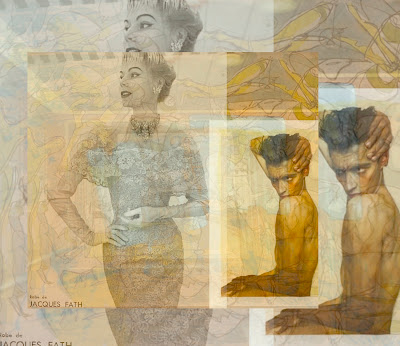Sunday, April 29, 2012
Saturday, April 28, 2012
Friday, April 27, 2012
Tuesday, April 24, 2012
Saturday, April 21, 2012
Wednesday, April 18, 2012
17 Ways of Looking: Notes on Collage
1
Collage is a way of looking. In making collage, you see things anew. Old cigarette boxes, ticket stubs, images in old magazines—all points of view.
II
In collage I revise as I create—composing on the fly, pushing out the first draft “zone” as far as possible. I complete collages fast, often in minutes.
III
The viewer must “look” hard to see something of what the collagist is getting at in his looking. No seeing without looking.
IV
Motherwell didn’t smoke Gauloises but admired its brand of blue. Ray Johnson heard a pun in Lucky Strike & used its circle logo over & over.
V
Use a glue stick for ease of motion & for the brief window of slipperiness it affords—nudging the paper piece onto its base before the glue hardens.
VI
Draft: an actor on opening night, full house. Revision: the same actor, house half empty, at the end of play’s run. Can the spirits be summoned?
VII
You can always add a new layer to the work by collaging over the initial draft. There will be an invisible film separating the two acts.
VIII
Critic Ted Gioia posits that all breakthroughs in art spring from boredom—the artist, half-baked, reckless, gets bored enough to throw out old models.
IX
Look at one image, you can’t help but see it in relation to another; a third force enters the field to alter and confuse the dialectic pair.
X
If you don’t risk ruining a piece for fear of over-revising it, you’re not really making collage.
XI
Gioia on improvisation: “Only a particular type of temperament would be attracted to an art form which values spur-of-the-moment decisions over carefully considered choices…the haphazard to the premeditated.”
XII
Johnson didn’t like his work to become fixed or labeled; he went to great lengths to make sure the image—idea, perception, object—changed shape.
XIII
Recycling everyday material becomes a dominant urge. You not only refuse to give up this approach but turn it into your own philosophy of re-use.
XIV
The way out is through. Keep making moves until the opening presents itself. Surprise yourself. Remember what you never knew you knew.
XV
Don’t get too caught up in finding meaning in every little detail. You catch a drift of the mood then follow it in. Let the work show you how to see.
XVI
With each geographic move you encounter a range of newness—new materials, new friends in a fresh scene. Each a new landscape to explore.
XVII
I try to avoid using current media in my work. I look first for materials from other eras & zones of life—things out of context, out of mode.
Collage is a way of looking. In making collage, you see things anew. Old cigarette boxes, ticket stubs, images in old magazines—all points of view.
II
In collage I revise as I create—composing on the fly, pushing out the first draft “zone” as far as possible. I complete collages fast, often in minutes.
III
The viewer must “look” hard to see something of what the collagist is getting at in his looking. No seeing without looking.
IV
Motherwell didn’t smoke Gauloises but admired its brand of blue. Ray Johnson heard a pun in Lucky Strike & used its circle logo over & over.
V
Use a glue stick for ease of motion & for the brief window of slipperiness it affords—nudging the paper piece onto its base before the glue hardens.
VI
Draft: an actor on opening night, full house. Revision: the same actor, house half empty, at the end of play’s run. Can the spirits be summoned?
VII
You can always add a new layer to the work by collaging over the initial draft. There will be an invisible film separating the two acts.
VIII
Critic Ted Gioia posits that all breakthroughs in art spring from boredom—the artist, half-baked, reckless, gets bored enough to throw out old models.
IX
Look at one image, you can’t help but see it in relation to another; a third force enters the field to alter and confuse the dialectic pair.
X
If you don’t risk ruining a piece for fear of over-revising it, you’re not really making collage.
XI
Gioia on improvisation: “Only a particular type of temperament would be attracted to an art form which values spur-of-the-moment decisions over carefully considered choices…the haphazard to the premeditated.”
XII
Johnson didn’t like his work to become fixed or labeled; he went to great lengths to make sure the image—idea, perception, object—changed shape.
XIII
Recycling everyday material becomes a dominant urge. You not only refuse to give up this approach but turn it into your own philosophy of re-use.
XIV
The way out is through. Keep making moves until the opening presents itself. Surprise yourself. Remember what you never knew you knew.
XV
Don’t get too caught up in finding meaning in every little detail. You catch a drift of the mood then follow it in. Let the work show you how to see.
XVI
With each geographic move you encounter a range of newness—new materials, new friends in a fresh scene. Each a new landscape to explore.
XVII
I try to avoid using current media in my work. I look first for materials from other eras & zones of life—things out of context, out of mode.
Sunday, April 15, 2012
Saturday, April 14, 2012
Monday, April 9, 2012
Monday, April 2, 2012
Subscribe to:
Comments (Atom)



















